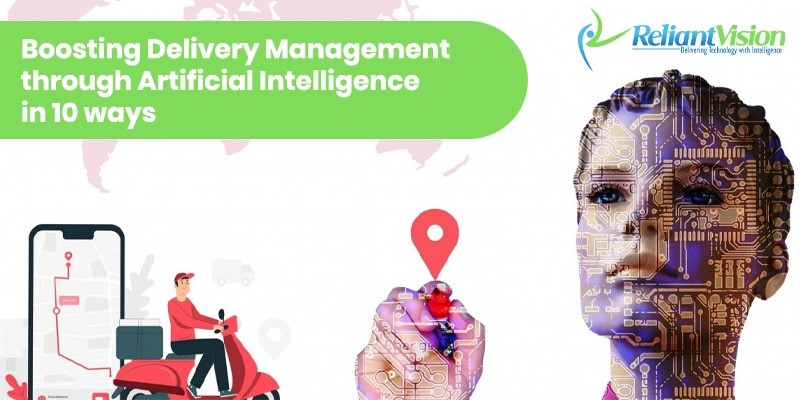Technological advancements and disruptions are already driving the top-of-the- line logistic companies. In this age of digital revolution, technologies like artificial intelligence and machine learning play a key role. Artificial Intelligence or AI has immense potential to transform businesses as it eliminates the problems and makes the supply chain process seamless.
With cognitive automation, artificial intelligence is playing a critical role in saving time, lowering costs, rising efficiency, and improving accuracy. Integrating AI in Delivery Management can help automate day-to-day tasks that allows in focusing on core business activities.
Delivery management is a field that needs analysis and precision. It controls the delivery of goods or materials from suppliers to final customers. It is the responsibility of logistics professionals to focus on transportation such as procurement and planning of transportation for goods and/or materials.
Ten ways of boosting delivery management through artificial intelligence
Artificial Intelligence can play a crucial role in delivery management that is conducive to optimizing the processes, avoiding mistakes, reducing time and predicting future opportunities and challenges. Some of the 10 ways through which AI can help in effective delivery management include-
- Automation-
AI is enabling the tracking of goods more accessible as it uses virtual assistants, data analysis and augmented reality to streamline the process. More importantly with the latest technologies like using GPS and maps, making deliveries is getting quite effective without the scope of any human error.
AI is also capable of studying customer moods through data and lets you know which products or goods would be in demand soon or those goods that might fail to capture consumer interest. This process is known as demand forecasting.
- Smart Warehouse
Warehouse inefficiency is a common issue in logistics, as it not only increases the wasted time and energy within the operation but also drives up the costs. Using AI helps in automating the process of sorting and packaging by dividing them into different groups and in keeping the assembly lines moving. For instance, AI robots can stock shelves, move items and even pick and pack orders all on their own.
- Optimized routes
Optimizing the carrier routes using AI helps in improving the logistics operations and reducing the time to pick up and deliver the goods. AI can suggest the shortest route that the driver can take to reach the destination (avoiding rush hour traffic) to deliver the package at the customer/client’s doorstep.
- Unmanned Fleet
AI is enabling the emergence of autonomous vehicles or unmanned fleets fitted with sensors to detect nearby dangers, lane departures or issues within the vehicle’s mechanics. These ‘intelligent vehicles’ can operate in conjunction with human drivers or completely alone resulting in reduced time spent in driving, optimizing routes and reducing fuel usage in the process of driving your shipments.
- Boosting productivity
Artificial intelligence is enabling the supply chain to become more efficient and accountable. Through sending automated messages to the customers to help them track their products, can help in managing their expectations while simultaneously multiplying productivity.
- Detecting risks
Using AI can help in detecting risks when it comes to recalled products such as contaminated food or medicines as retailers can easily determine which shipments are at risk.
- Prevent frauds
AI-based tools are capable of enhancing product quality and reducing malpractices. By conducting automatic inspections, audit process and real time analysis of the entire system can help in identifying any deviations from standard patterns thereby resulting in prevention of frauds.
- Voice assistants/Chatbots
Artificial intelligence taking shape in the form of voice assistants like Amazon’s Alexa or Chatbots is helping customers track their orders placed with logistic providers. These Chatbots or robots are capable of performing daily tasks such as placing purchasing requests, handling suppliers and customers, filing invoices etc. without any physical intervention thereby minimizing human errors.
- Reduction of response time and costs
Using bots running on AI even though is an expensive affair promises high returns in the long term. It not only improves the quality of work but also ensures in waste reduction.
- Workforce management
Artificial Intelligence can also be used in managing the workforce involved in delivery management. As it allows seamless workflow activity, better work assignments and an increased employee productivity.
Overall, AI is playing a key role in making logistic operations smarter every other day and has opened up new avenues for companies involved in delivery management.

